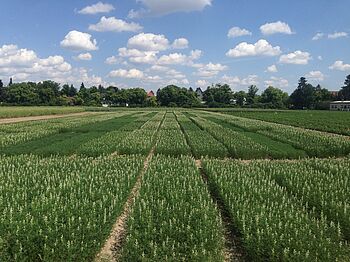Inhalt: Project details
Duration
11.2022 - 10.2025
Contact person
Dr. Thorben Sprink (SB)
Tel: +49 (0)3946 47 3370
thorben.sprink@julius-kuehn.de
JKI Project team
Institute for Biosafety in Plant Biotechnology (SB)
Institute for Breeding Research on Agricultural Crops (ZL)
Institute for Strategies and
Technology Assessment (SF)
Project partner
Federal Office of Consumer
Protection and Food Safety (BVL)
- Nicola Consmüller
Nicola.Consmüller@bvl.bund.de
The project "TRIP" is funded by the Federal Ministry of Food and Agriculture as part of the German Climate Protection Programme 2022.
TRIP is a collaboration project with the Johann Heinrich von Thünen Institute.
Inhalt: Greenhouse gas reduction through innovative breeding advances in alternative plant protein sources (TRIP)
Background:
More and more people are eating more consciously and are concerned with their impact on the climate and the environment. Regionality of food and the reduction of meat and animal products, as well as the personal ecological footprint, are seen by many consumers as particularly important. Reducing animal protein with plant-based alternatives offers great potential for reducing greenhouse gas (GHG) emissions such as CO2, methane, and nitrous oxide, which are particularly prevalent in dairy and meat production.
However, increasing substitution of cow's milk and meat with plant-based alternatives has implications for all related value chains. National, European and global environmental and economic impacts of changes in plant-based substitutes, agricultural income, production and trade are also relevant. There is also scope for further breeding of plants that are particularly suitable for substitution.
Objectives:
The project aims to promote and analyze alternative, plant-based protein sources as dairy and meat substitutes to reduce GHG emissions more rapidly. It combines practical classical breeding approaches to develop improved oat lines and new molecular techniques in oat and lupin with estimation of climate effects and socio-economic assessments. Other legumes (pea, soybean) are also considered as alternative plant protein sources. The oat lines created can be immediately further developed for breeding purposes and, if necessary, used directly for variety development. The evaluation of climate effects and socio-economic impacts will serve to inform decision-making and stakeholders in the value chain. The establishment of the new methods can be taken up in research as well as in future breeding.

